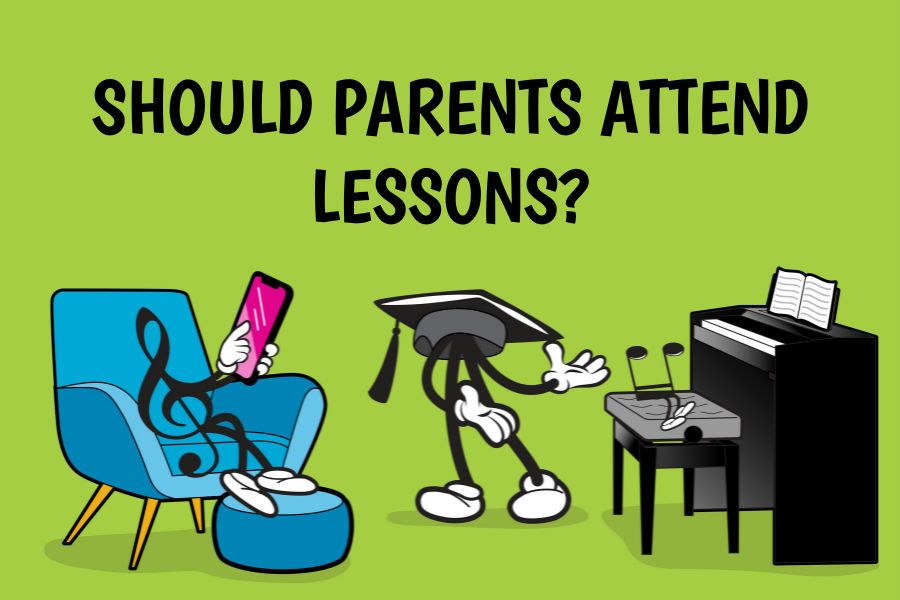Should Parents Attend Lessons?

For almost all of my teaching life, I have encouraged parents to attend their children’s piano lessons. I have always enjoyed having them there to observe and participate in the lesson, to help me moderate the child’s behaviour if necessary, or generally just to watch how I teach and therefore be able to follow up at home. I feel lucky to teach in an environment where I have opportunity to avail myself of this support 1, as there is no doubt in my mind that the progress is faster when parents are informed and involved at home.
Then, during the first two years of Covid when there were severe restrictions on social distancing (here in Australia), I had to teach without any parents in the room at all 2. This took me a while to get used to. In some cases, progress slowed considerably, or I had to spend a lot more time writing detailed lesson notes. But I noticed that on the whole, the relationship between myself and my students was deepened, and I also noticed that the parental absence in some cases even freed up my teaching style a little bit 3. As the pandemic receded, some parents decided to come back; some now attend only occasionally, and some don’t attend at all.
Having cycled through the parent-attending vs parent-not-attending situation with all of my students, I have clarified my thoughts on whether parents should be in the room at all. In most cases, the benefit of having a supportive parent in the room outweighs the slight negative of affecting the dynamic between me and their child. If parents are able to reinforce at home everything they observed in the lesson, progress is significantly faster, and their motivation remains significantly higher.
But what happens when the parent is not exactly the balanced influence we would like? Should these parents still attend? For the purposes of this blog post I’m going to polarise them into two groups:
Parent A: the over-eager helicopter parent who interrupts and corrects their child as they play, and/or who answers questions on behalf of their child.4
Parent B: the preoccupied, distracted parent who scrolls on their phone.
Over the years I have learned how to swiftly and deftly handle Parent A. As soon as I feel it is necessary, we have a phone chat where I assure them I notice everything that is right or wrong about what their child is doing, and that if I am choosing not to say something about it, it’s because I’m forming a teaching moment in my head and I want to make sure their child learns from that teaching moment in the best possible way. This usually pacifies Parent A. 😊
Then, there is Parent B. (That’s who this blog post is really about.)
Since the post-pandemic WFH revolution, I’ve noticed more and more that these parents are not actually observing the lesson at all. They scroll on their phones, or tap on their computers 5. Busy busy busy. And I’ve realised something important:
This completely cancels out the benefit of them being in the room.
If the parent is absorbed by social media or answering email, then they are not paying attention to anything that is happening in the lesson. Therefore, the support they may offer at home is no different from if they had not attended the lesson at all. Which means that the relationship between me and their child has been impacted, for no good reason. If they’re just going to be on their phones, there is no benefit – they may as well wait in the car.
This is what I have laid out in my studio policy:
“I encourage parents to attend lessons frequently, as research shows that extra support at home vastly increases the rate of progress. Whilst having parents in the room can occasionally affect the dynamic of the lesson, this is far outweighed by the benefits of the parent taking notes and observing my teaching technique/style.
However, I strongly advise that if parents wish to use the lesson time to catch up with email or relax and scroll through social media, that they do NOT attend the lesson.
Occasionally, the rapport between me and the student improves when the parent is not in the room. In such cases I will be in touch personally to discuss.”
(Quick side note. There is actually a third group: Parent C. The dream parent who makes our lives easier, who DOES read the above policy. Maybe they are supportive and pro-active from the start, or maybe they started out as Parent A or B and took feedback on board. Either way, we teachers are always grateful for Parent C.)
But of course, as we know, most parents do NOT read our studio policies! So, the scrolling and the tapping goes on, and it is up to me to actually say something about it.
This is a very tricky thing to get across. How do I politely ask a fully grown adult to please put their phone down? It is rather degrading and humiliating for them, and super awkward for me. What is even worse is that on the occasions where I have managed to get their attention 6, it lasts barely five minutes before they have picked up their phone again! They are as addicted as any teenager!
So, I’ve found a compromise: I ask the parent to not attend until the last 10 minutes of the lesson 7. Then, this 10 minutes is quite interactive: basically showing mum or dad what we’ve done, going over the tasks for the week, kind of revising the lesson. It works well, but there is no doubt that this is not as efficient as having the parent present for the whole lesson and taking it all in.
I guess another approach is to have the same type of intense phone call with Parent B as I have with Parent A. I need to fully explain everything I’ve laid out above. I really value their attendance, and I totally get how busy life is for them, but it only really works if… etc. etc.… all of which goes towards a better music education for their child.
Or… I could also just send them this blog post.
What would you do?
- As opposed to peripatetic teachers, or those in a demographic where parents are mostly unavailable.
- Except for the online lessons, when the parents were nearby, sometimes cooking dinner and generally making the ‘original sound’ feature extremely challenging.
- I still haven’t decided whether that’s a good thing or a bad thing!
- On occasion even jumping in with the answer to a musical question when the child appears to be taking too long. These parents need reining in SUPER quickly.
- Which I find incredibly distracting ☹
- Usually through means such as “oh could you please come over here and watch this bit” or “how about mum joins in this game too?” It doesn’t really work.
- I teach 45 minute lessons

Don’t forget, some parents will actually be taking down practice notes on their phone. I used to do that for my kids when they had a teacher who gave excellent lessons but rarely wrote anything down.
Good point, thanks Isabel! That might be a great way to bypass awkwardness… ask them if they are taking notes!
Thank you for your perspective. I am with you all the way! Only this week I had a very distracted pair of sibling boys whose mum is so laid back she is no assistance in reigning them in at all.
I am drafting an email to ask if she would take the boy not actively in the lesson to the nearby park for 25 minutes and then swap. If it’s raining there’s the car option or my large covered area outside the Studio.
This will allow a little time for interaction eg a duet piece or game in the swap over time.
I feel this is a gentle way of achieving the better rapport with each boy. As I’ve had each separately on one occasion, I they are more focused and therefore more cooperative.
Fingers crossed it helps!!
Oh my goodness, it’s hard enough having the parents in the room without a sibling as well! I think your plan of asking her to take him to the park is a great one.
Most parents with phones are useful. I often ask them to video me demonstrating a particular piece or difficult passage to help with practice at home, and they are more than happy to do so.
However, some parents are next to useless. I started a little boy this year who obviously had behavioural issues. When he arrived for his first lesson I opened the door to see him hitting his mother! She was a mixture of both A and B – a helicopter parent who was also glued to Facebook. He was extremely distracted by her, and I could tell that a lot of his behavioural issues were due to her interference. I was at the point of terminating his tuition when, one day, the boy’s dad brought him and he was much better behaved. The following week his mother let him come in on his own and – presto! – he was a completely different child. I told the mother that he was much more receptive to me when on his own, so now he comes by himself and is flourishing at piano!
It very much depends on the parent-child dynamic.
It’s wonderful when we finally discover the dynamic that works best! I’m so glad he is flourishing with you. 🙂
Reading your post and the comments was extremely interesting. My experience tends to fall in line with improved relationships with the children when they don’t have to please both me as teacher and their parents, and parental expectations, at the same time. I do agree with parents being present towards the end of the lesson- there’s an opportunity for the student to perform something as a lovely suprise for their parent and, yes, an opportunity to revise the lesson and summarise my expectations for followingn up at home. For some families it was important for them that I taught in their own home, the parents were always an asset in this situation as they are always occupied, but listening too.
The best ever experience I had was when a grandparent brought the students and remained with them, I appreciated his balanced and mature perspective. And now I’ve been asked to teach the next generation of that family!
Slightly related … in school holidays I would attempt to give a lesson in student’s homes and it was amazing how many pianos suddenly were tuned! And the experience helped me towards a better understanding of the child’s background.
Thanks for your excellent comments, Elissa!
Im a 54 years-old father, learning the piano with my son 9 years old …I will take advantage from his piano lesson, and knew the series of the music book, my son just started to do the beginner, learning the language of music…thanks….
It’s wonderful to learn along with your child!